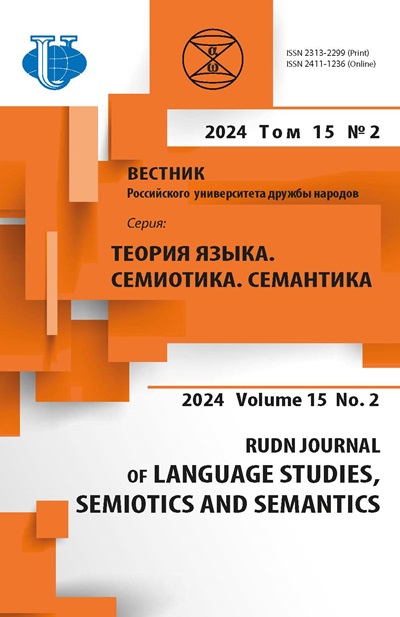Representation of Bacchic Worldview in a Literary Text
- Authors: Bochina T.G.1, Dimitrieva O.A.2
-
Affiliations:
- Kazan Federal University
- Chuvash State Pedagogical University
- Issue: Vol 15, No 2 (2024)
- Pages: 567-580
- Section: LITERARY TEXT
- URL: https://journals.rudn.ru/semiotics-semantics/article/view/39857
- DOI: https://doi.org/10.22363/2313-2299-2024-15-2-567-580
- EDN: https://elibrary.ru/ODQGRY
Cite item
Full Text
Abstract
Wine drinking as a cultural phenomenon is becoming the subject of research in various sciences, such as art history, cultural studies, semiotics, philology, etc. The situation of wine drinking as a fragment of the semantics of the text is the subject of the linguopoetics of the text and linguoculturology. The purpose of this study is to consider the situation of wine drinking, its functioning in the world of a work of art. The material for the work is a selection of examples extracted from prose, from the second half of the XIX century to the present days. A wide time span allows us to trace understanding and interpretation of wine drinking situation in dynamics. The examples contain bacchic vocabulary, i.e. lexemes that have the meaning ‘to drink alcohol’. The relevance of the study is related to its entry into the circle of interpretive semantic research, in which the authors pay attention to features of both the idiosyncratic traits of the writer and universal, nationwide, inherent characteristics of the period of time. The main research methods are continuous sampling method for extracting illustrative material from literary works of writers that contain bacchic vocabulary; as well as semantic and descriptive methods. The main functions of the wine drinking situation in texts are, firstly, plot-modeling, promoting the narrative outline of the work; secondly, background, reproducing the historical and cultural background of the event line; thirdly, characterizing, defining the properties and qualities of a character described, a participant of the event. The paper also shows how the world of an artistic work reflects a historical and cultural period, the realities relevant to it, as well as the individual author’s arsenal of linguistic means, which is a representative of a subjective view and assessment. It is concluded that tracing the dynamics of the situation of wine drinking through the study of bacchic linguistic means makes it possible to determine the dominant in a particular period of time.
About the authors
Tatyana G. Bochina
Kazan Federal University
Email: Tatyana.Bochina@kpfu.ru
ORCID iD: 0000-0002-2606-2985
SPIN-code: 2455-0673
Dr.Sc. in Philology (Advanced Doctorate), Professor at the Department of Foreign Languages in the Field of International Relations
18 Kremlevskaya str., Kazan, Russian Federation, 420008Olga A. Dimitrieva
Chuvash State Pedagogical University
Author for correspondence.
Email: olgaal_79@mail.ru
ORCID iD: 0000-0003-2734-640X
SPIN-code: 9686-0190
PhD in Philology, Associate Professor at the Department of Russian and Chuvash Philology and Cultural Studies
38, K. Marx str., Cheboksary, Russian Federation, 428000References
- Lotman, Yu.M. (1999). Conversations about Russian culture: The life and traditions of the Russian nobility (XVIII — early XIX century). St. Petersburg: Art-St. Petersburg. (In Russ.).
- Codes of everyday life in Slavic culture: food and clothing (2011). N.V. Zlydneva (Ed.). St. Petersburg: Aleteya. (In Russ.).
- Slavic Antiquities: An Ethnolinguistic dictionary (1995). N.I. Tolstoy (Ed.). Moscow: International Relations. (In Russ.).
- Glushkova, T.S. (2009). Wine drinking. Anthology of concepts. Vol. 7. Volgograd: Peremena. рр. 234–244. (In Russ.).
- Olyanich, A.V (2015). Bacchanalian discourse. Discourse-Pi, 2, 155–157. (In Russ.).
- Kozko, N.A. & Pozhidaeva, E.V. (2012). Modern British restaurant discourse: linguoculture of nutrition and drinking. Pushkin Leningrad State University Journal, 1(4), 166—175. (In Russ.).
- Olyanich, A.V. & Reimer, Yu.V. (2013). Linguosemiotics of Bacchanalian discourse: GermanRussian parallels. Volgograd: Volgograd State Agrarian University. (In Russ.).
- Lomakina, O.V. (2018). Phraseology in the text: functioning and idiostyle. Moscow: RUDN. (In Russ.).
- Kozubovskaya, G.P. (2021). Semantic complex of food in I.A. Goncharov’s novel “Cliff”. Culture and text, 4(47), 203–220. https://doi.org/10.37386/2305-4077-2021-4-203-220 (In Russ.).
- Kupchik, E.V. (2017). Wine in Russian poetic texts: metaphorical models. Pushkin Readings-2017. Artistic strategies of classical and new literature: genre, author, text. St. Petersburg: Pushkin State University. pp. 342–351. (In Russ.).
- Zyhovskaya, N.L. (2015). Olfactory component of the concept “wine” in the Russian prose tradition. Chelyabinsk Humanities, 2(31), 61–69. (In Russ.).
- Khimich, V.V. (2006). Aesthetic activity of images of food and drink in the works of Mikhail Bulgakov. Proceedings of the Ural State University. Series 2: Humanities, 47(12), 204–224. (In Russ.).
- Iriskhanova, O.K. (2013). On the distribution of attention in narrative texts: an analysis of the story of J. Updike “Daughter, last glimpses of”. Vestnik MSLU, 17(677), 18–36. (In Russ.).
- Valgina, N.S. (2003). Text Theory. Moscow: Logos. (In Russ.).
- Karaulov, Yu.N. (2001). The concept of idioglossy and the dictionary of Dostoevsky’s language. In: Dostoevsky’s Word, 2000. Moscow: Azbukovnik. pp. 424–444. (In Russ.).
- Boldyrev, N. (2020). The interpretive dominant in the cognitive theory of language. EpSBS European Proceedings of Social and Behavioural Sciences, 83, 1–8. https://doi.org/ 10.15405/epsbs.2020.04.02.1
- Han, S. Northoff, G., Vogeley, K., etc. (2013). A cultural neuroscience approach to the biosocial nature of the human brain. Annual Review of Psychology, 64, 335–359. https://doi.org/10.1146/annurev-psych-071112-054629
- Sharifian, F. (2003). On cultural conceptualisations. Journal of Cognition and Culture, 3(3), 187–207
- Sharifian, F. (2017). Cultural Linguistics: Cultural conceptualizations and language. Amsterdam — Philadelphia: John Benjamins Publ.
- Peeters, B. (2016). Applied Ethnolinguistics Is Cultural Linguistics, but Is it Cultural Linguistics? International Journal of Language and Culture, 3(2), 137–160. https://doi.org/10.1075/ijolc.3.2.01pee
- Dimitrieva, O.A. (2021). Bacchic vocabulary, verbalizing the object of drinking, in the artistic world of Alexander Green. Scientific Dialogue, 4, 80–96. https://doi.org/10.24224/22271295-2021-4-80-96. (In Russ.).
- Solntseva, N.M. (2002). About some universals of new literature. Lomonosov Philology Journal. Series 9. Philology, 2, 35–46. (In Russ.).
- Dimitrieva, O.A. (2020). About the Bacchanalian vocabulary in F.M. Dostoevsky’s novel “Crime and Punishment”. Russian Speech, 1, 56–67. https://doi.org/10.31857/S013161170008295-3. (In Russ.).













